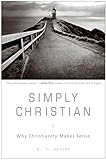Feature Blog:Simply or Merely? Comparing Mere Christianity and Simply Christian
Seeing how Mere Christianity is one of my all time favorite books, I found this InternetMonk Blog to be a great fit for this "featured blog." Make sure you go read the entire blog here. Mere Christianity and Simply Christian are far more different than they are similar, and comparisons of one to the other are probably not necessary. Both have a role to play. Here’s my assessment of which is the better book when I look at both in various ways.
Mere Christianity and Simply Christian are far more different than they are similar, and comparisons of one to the other are probably not necessary. Both have a role to play. Here’s my assessment of which is the better book when I look at both in various ways.
Best Conversation Starter With A Non-Christian: Lewis. Hands down. His logic, voice, illustrations, humor and unforgettable conclusions are as provocative as ever.
 Best Apologetic: The answer here depends on how we define apologetics. Both Ravi Zacharias and James White are apologists. In the sense of making an appealing and convincing case, I give the nod to Wright. If I were voting on the strength of individual arguments that might “score points,” then Lewis.
Best Apologetic: The answer here depends on how we define apologetics. Both Ravi Zacharias and James White are apologists. In the sense of making an appealing and convincing case, I give the nod to Wright. If I were voting on the strength of individual arguments that might “score points,” then Lewis.
Readability: Lewis’s prose is accessible, but less and less as time goes by. Still, if I had to give one of the two books to the average literate adult in my home of Clay County, I’d go with Lewis. Much of Mere Christianity is still accessible to even a high school audience. Wright goes deeper, and even when he is writing a non-scholarly book, he sounds more like an Oxford professor than a blue-collar pastor. (That’s not a bad thing. I just think Lewis was able to talk with ordinary people in an unusual way for such a scholarly giant.)
Best Presentation of Jesus: Wright has a lot more to say about Jesus. His sections on Jesus are outstanding summaries of the current state of Jesus scholarship. Lewis keeps his discussion of Jesus almost entirely on the incarnation and the atonement. Wright does the better job here.
Best Overview of the Faith: Wright. No contest. This would be an excellent book for a “Christian Theology 101” weekend or short class. Lewis never intends to overview the whole Christian story.
Most Successful at What Was Attempted: I think Lewis wrote a great book somewhat by accident. Wright, on the other hand, set out to produce a simple, accessible overview of the faith, and I think he succeeded completely. Wright gets the nod.
Most Theologically Conservative: Lewis simply doesn’t show his hand at many issues. Wright is orthodox, but certainly doesn’t buy into fundamentalism, or even some of the common assumptions of conservative evangelicalism. Lewis wins here, but on presumption. Wright is no liberal on the essentials, that’s for sure, and much of his contribution is to get beyond these labels to something more useful.
Best Organization: Lewis’s chapters build on one another at key points. Wright’s book is elegantly harmonious and exceptionally crafted. Wright wins.
Can Only Buy One: Go to Amazon and buy both used. No way you need to make that choice.








2 comments:
Not bad for a bunch of Anglicans, lol.
You can't beat Lewis's witt, everytime I read something by him I just picture him sitting in a big chair, smoking on a pipe, wearing a wool hat, and snickering about how ignorant everyone else is. His humor and examples are one of a kind, but he is just so hard to pin down. I have come to conclude that he doesn't have a systematic type theology he is just C.S. Lewis.
But N.T is just so dang smart, he seems to be more on track and detailed about what he thinks, which is kind of weird for Anglicans who always seem to be in the middle, jumping back and forth from catholic and protestant thinking.
Anyway I thought I-monk did a good job on the comparison.
But, I'm not sure about N.T. and his new perspectives on Paul, I don't think I agree with it, but I don't know enough about it to critique it.
Post a Comment